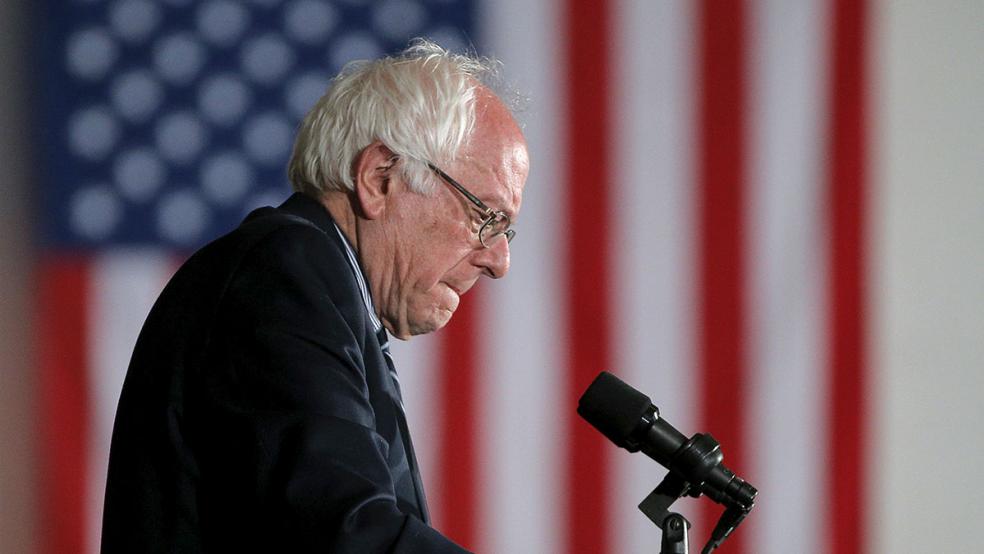Sen. Bernie Sanders of Vermont needs a very strong showing in Michigan’s Democratic primary Tuesday night to keep alive his faint hopes of somehow overtaking former secretary of state Hillary Rodham Clinton for the presidential nomination – but the political gods appear to be arrayed against him.
After taking a beating from Clinton in South Carolina and a string of other southern states with large African American populations, Sanders eyed Michigan, a major Midwestern industrial state with a smaller black population, as fertile ground for his campaign themes of income inequality, the abuses of Wall Street, a corrupt campaign finance system and “unfair” trade agreements like NAFTA that drove millions of U.S. jobs overseas.
Related: Could Clinton Choose Sanders as Her Vice President?
But Sanders has stumbled badly during the past week, especially during the two-hour nationally televised Democratic debate in Flint Sunday night, and has spent the fleeting hours of the Michigan campaign engaging in damage control.
A new NBC News/WSJ/Marist poll shows Clinton leading Sanders among likely Democratic primary voters by 17 points, 57 percent to 40 percent.
The survey shows Clinton once again far ahead of Sanders among African Americans, 76 percent to 21 percent, and favored by six in ten older men and women. Sanders, meanwhile, leads Clinton among independents, 60 percent to 36 percent, and those under the age of 45 by a margin of 61 percent to 36 percent. Their support is pretty evenly divided among white voters.
During Sunday night’s debate, Sanders pummeled Clinton for her support of trade deals dating back to the 1990s and the administration of former President Bill Clinton, and for backing the 2009 financial bailout of Wall Street banks. He repeatedly attempted to connect those measures with economic decline in Michigan and other industrial centers.
Related: 18 Possible Picks for Hillary’s Vice President
But Sanders was totally blindsided when Clinton blasted him for opposing an $82 billion relief package for the auto industry that was part of the larger TARP financial bailout legislation sought by President Obama in 2009. “If everybody had voted the way he did, I believe the auto industry would have collapsed,” Clinton declared, leaving Sanders shaking his head and complaining that she had delivered a low blow.
Sanders the next day told supporters that Clinton had distorted his record and that in fact he had cast a vote in the Senate on Dec. 11, 2008, for an earlier version of an auto industry bailout that was never enacted. Sanders said that Clinton’s charge that Sanders had voted against the money that ended up saving the auto industry was “absolutely untrue,” but it was too late to undo the damage.
There were plenty of other problems as well.
Sanders and Clinton have been tangling for months over gun control in the wake a spate of mass shootings. Clinton accused Sanders of opposing -- until recently -- tougher laws for regulating background checks of gun purchasers. She has also renewed her complaint that Sanders supported a 2005 bill that provided gun makers, sellers and trade associations with significant protection against lawsuits.
Related: Clinton and Sanders Demand Gov. Snyder Resign Over Flint’s Water Crisis
Sanders, who represents a small, rural state where guns are widely accepted, has occasionally sided with gun rights advocates on key legislation but other times has opposed their positions.
While he boasts of having a “D-minus” rating from the National Rifle Association, Sanders strayed into dangerous territory Sunday night in explaining his support for the legislation that shielded gun manufacturers from for liability for crimes committed by people who legally acquired their fire arms.
“If you go to a gun store and you legally purchase a gun, and then, three days later, if you go out and start killing people, is the point of this lawsuit to hold the gun shop owner or the manufacturer of that gun liable?,” Sanders said. “If that is the point, I have to tell you I disagree.”
Sanders didn’t stop there. Warming to the subject, he warned that taken to a logical extreme, efforts to hold gun manufacturers and dealers responsible for crimes committed with guns they sold would cripple the gun industry. “If they are selling a product to a person who buys it legally, what you're really talking about is ending gun manufacturing in America. I don't agree with that.”
Related: How the Flint Drinking Water Crisis Became a Political Punching Bag
“That is like the NRA position,” Clinton protested.
And sure enough, the next day the NRA, the main lobby for the gun industry, tweeted that Sanders’s position was “spot on.” It wasn’t the type of endorsement Sanders and his campaign had been hoping for one day before the primary.
A spokesman for Clinton gleefully said that “what more do we need to know” about Sanders’s record on gun control. Clinton supporters said that the NRA’s compliment had proved that Sanders was out of step with most Democrats on the gun control issue.
Sanders had other problems at the debate: The 74-year-old senator seemed grumpy for much of the night. He frequently raised his eyebrows, grimaced and held up a finger to signal his displeasure with what Clinton was saying and to get the attention of the CNN moderator.
At one point he shushed the former first lady and said, “Excuse me, I’m talking.” Clinton fired back: “If you’re going to talk, tell the whole story,” to which Sanders replied: “Let me tell my story, you tell yours.”





